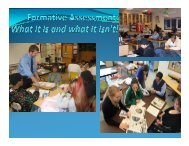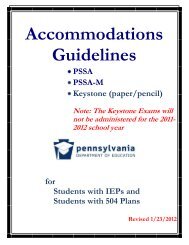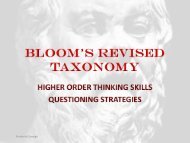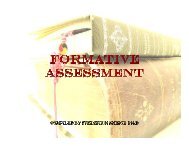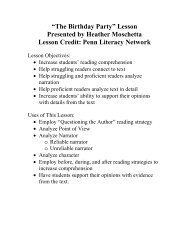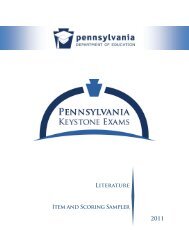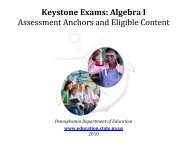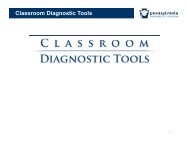FORMATIVE ASSESSMENT (Assessment for learning)
FORMATIVE ASSESSMENT (Assessment for learning)
FORMATIVE ASSESSMENT (Assessment for learning)
Create successful ePaper yourself
Turn your PDF publications into a flip-book with our unique Google optimized e-Paper software.
The teacher must begin with the end in mind, often referred to as backward design. Be<strong>for</strong>e<br />
beginning the unit the teacher should:<br />
‣ target the standards and clarify their meaning <strong>for</strong> the student<br />
‣ create a comprehensive list of concepts and competencies from the standards and<br />
essential questions<br />
‣ define the data collection methods throughout a unit of study<br />
‣ determine how you will analyze and diagnose student response<br />
Once the assignment is completed, the teacher should provide descriptive feedback and plan <strong>for</strong><br />
re-teaching based on who “got it” and who didn’t. The teacher will know who got it and who<br />
didn’t by using rubrics linked to the concepts and competencies that were targeted.<br />
Students may not be proficient in their <strong>learning</strong> <strong>for</strong> numerous pedagogical reasons (Stiggins,<br />
2007).<br />
Some reasons are:<br />
Students may not have a clear vision of the standards.<br />
Students may not be clear on the quality expected of them.<br />
Students may not have been focused on the <strong>learning</strong> tasks.<br />
Students may not have sufficient background knowledge.<br />
Students may not have had sufficient guided practice<br />
Students may require an exemplar.<br />
Students may need a visual approach i.e. graphic organizer<br />
Students may need a scaffolded approach to <strong>learning</strong> the standard<br />
Students may lack the prerequisite skills <strong>for</strong> the present <strong>learning</strong> standard<br />
Student <strong>learning</strong> may be affected by common misconceptions, either conceptual,<br />
( conflicts from preconceived notions that are incorrect i.e. believing space and time<br />
is two dimensional) vocabulary (misunderstanding of the meaning of key vocabulary)<br />
or factual (rivers always flow north, objects of different weights fall at different<br />
speeds, lighting never strikes twice in the same place).<br />
After diagnosing the student’s <strong>learning</strong> problem, the teacher needs to develop effective strategies<br />
<strong>for</strong> moving the student <strong>for</strong>ward.<br />
Tunstall and Gipps (1996) indicate that students prefer descriptive feedback (what the student is<br />
either doing or saying) as opposed to evaluative feedback (judging the standards-based <strong>learning</strong>)<br />
because evaluative feedback often comes across as a put-down.<br />
Feedback can be teacher-directed or focused on the students’ own suggestions <strong>for</strong> improvement<br />
(Hall & Burke, 2003).<br />
FLS Page 15



